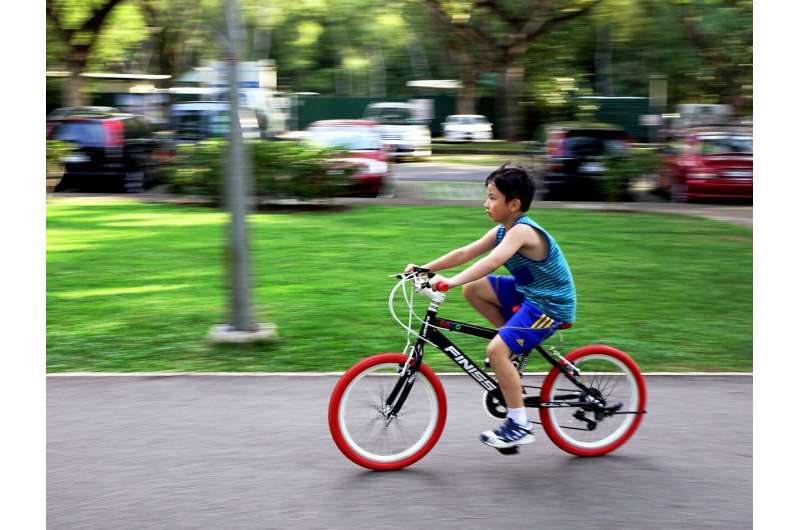This article has been reviewed according to Science X's editorial process and policies. Editors have highlighted the following attributes while ensuring the content's credibility:
fact-checked
trusted source
proofread
Cycling in school improves teenagers' mental health, but wider social factors may impact benefits

Physical activity has positive effects on mental health and yet, activity rates are declining. This is particularly worrying because the mental well-being of teenagers continues to deteriorate. In the US, one in six school children is diagnosed with some type of mental disorder.
Riding bikes is a promising approach to introduce school-aged children to physical activity. Now, researchers in the US have investigated how adolescents' psychosocial well-being changed after participating in a school-based cycling program.
"Participation in a school cycling education program during the COVID-19 pandemic was associated with improved psychosocial well-being among middle schoolers in the US," said Dr. Esther Walker, research director at the non-profit organization Outride. "While we saw promising increases in some student subgroups, certain groups had higher levels of self-reported mental well-being both before and after participating in the program."
"It was really encouraging to see such a positive student response to a cycling-specific physical education program," said Fletcher Dementyev, a research assistant at Loma Linda University and first author of the study published in Frontiers in Sports and Active Living. "This motivates us, and hopefully others, to continue investigating and developing cycling as a pathway to improved health and well-being in adolescents."
Riding out for better mental health
Outride is a not-for-profit organization partnering with schools to provide cycling programs. "The Riding for Focus (R4F) program aims to equip students with basic cycling knowledge and experience, so that they may ride safely and confidently," Walker explained.
"A bicycle can be used for leisure activities, competition, and transportation. Thus, not only are students participating in an activity that improves their health and well-being, but also one that empowers them to explore the world," said Dr. Sean Wilson, a researcher at Loma Linda University and the study's senior author.
More than 1,200 middle schoolers, aged 11 to 14 years, participated in the program's surveys. Before and after cycling, they completed two surveys that included measures of current mental well-being and psychological functioning. Given the improvement in teenagers' mental well-being scores, short term physical activity programs hold promise of having a positive influence on mental health and well-being in adolescents, the team said.
Privilege determines well-being
Next to overall well-being, the scientists examined social risk factors that influenced well-being pre- and post-program participation. "We focused on a number of key risk factors that affect mental health and well-being in middle school aged children in the US, including socio-economic status, gender, and race," Wilson explained.
Relative risk assessments indicated that males, white students, and those from high socio-economic status families still had reduced relative risk of developing psychosocial disorders post-intervention. For example, female students' well-being improved significantly; male students, however, still had higher well-being scores compared to females after the program. There also was a significant post-program increase in the well-being of non-white students. This positive impact is supported by studies showing that physical activity programs can positively influence the psychosocial well-being of ethnic minorities, particularly those from low-income families.
"While participating can certainly contribute positively to one's day-to-day life, ultimately, to see large scale improvements, changes in policy, reductions in systematic disparities in access to nutrition, health services, safe environments, and beyond need to be put in motion," said Walker.
The authors also pointed to limitations of their study, one being a study population that is different from the countrywide student population. "This means that our results, though insightful, aren't fully reflective of the national youth physical education context," said Dementyev. "We see this study as the beginning of a national dialog surrounding investment in cycling education and its potential returns."
More information: Esther Walker et al, Middle School Cycling Program is associated with improved Mental Health and Wellbeing in Adolescents during COVID-19, Frontiers in Sports and Active Living (2023). DOI: 10.3389/fspor.2023.1255514




















